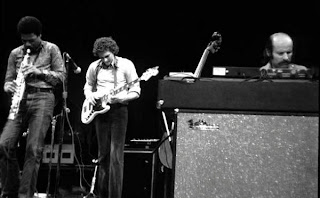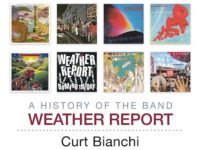As one of the seminal jazz-rock bands of the seventies, Weather Report has been plenty celebrated and covered. And yet, most of the recognition covers the 1976-1982 period in which the groundbreaking bassist Jaco Pastorious was in the band. Truth is, WR was a great band for the five-plus years it existed before his arrival, and it’s been high time someone feted its early years of limitless invention. Who better to carry out that task than Weather Report’s founding bassist, Miroslav Vitous?
Miroslav Vitous is no Jaco Pastorius, but it’s equally fair to state that Pastorius was no Vitous, either. The young man from Prague who arrived in the U.S. from Czechoslovakia in 1966 quickly found work with some of the bigger stars in jazz, appearing on Donald Byrd’s The Creeper just a year later and also on records by Roy Ayers, Herbie Mann and Jack DeJohnette. Most notable of his early work was with a rapidly flowering Chick Corea, as he and Roy Haynes completed a formidable trio for Corea’s masterwork Now He Sings, Now He Sobs. Vitous’ own solo debut Mountain In The Clouds from the late sixties is still considered among his best work.
Being closely associated with Miles Davis’ circle of musicians didn’t result in a regular stint in Miles’ band, but Vitous did end up founding Weather Report with Davis alumni Joe Zawinul and Wayne Shorter in 1970. Their first, self-titled album from 1971 didn’t reinvent fusion but it was such an outstanding continuation of the ideas Miles introduced in In A Silent Way and Bitches Brew, that this debut quickly established WR as a major force in this still-nascent music form. As the band moved away from the debut’s free-flowing melodies and intense group dynamic, Miroslav felt more isolated as the band moved toward world rhythms and more structured pieces, resulting in his departure after 1973’s Sweetnighter.
A few years later, Pastorius showed up, and for many, this is where Weather Report history began. Vitous would beg to differ, and it’s the relative neglect of this supergroup’s wide open early days that has inspired him to offer this singular take on the importance of Weather Report to fusion jazz.
For Remembering Weather Report, Vitous’ tribute to that original line-up reintroduces the concepts but not really replicating anything else about WR, such as the songs or the electronic instrumentation. That forces the listener to concentrate solely on those concepts to find the connection back to the original music. I firmly believe that Vitous intended exactly that on purpose.
The concepts, as it were, can best be summarized by the famous quote about the famous band, “we always solo and we never solo.” This was especially true about the band during the Vitous Era, when the traditional partition between the rhythm section and the frontline was all but obliterated, and everyone played as equals. Improvisation could occur, but instead of being done as isolated performances, they were done as conversations with each other. These concepts were hardly new in 1971; Ornette Coleman made this a central tenant of his harmolodics concept, and Bill Evans is often credited with elevating the role of the bass and drums in smaller ensembles, too. Weather Report took this conception even further out, and applied them to material that were not necessarily jazz, at least not in a very strict sense.
Vitous’ four piece band bears little resemblance to any fusion outfit, much less the one Vitous co-founded; there’s no percussionist and there’s no keyboards, not even a piano. Instead, Vitous (who sticks with acoustic bass exclusively), is joined by the Swiss trumpeter Franco Ambrosetti and Americans Gary Cambell (tenor saxophone) and Gerald Cleaver (drums). On half of these six tracks, notable French clarinetist Michel Portal joins in on bass clarinet.
Vitous, in completely avoiding the WR catalog, educates us on how these concepts can achieve freedom and expanded interplay from which prime performances can be obtained. This point is driven home most successfully on the first two tracks, where he is applying other composers’ work toward this vision. The first of these, “Variations Of W. Shorter,” uses fragments of Wayne Shorter’s “Nefertiti,” but always stop short of quoting the theme completely. Vitous and his bandmates take turns mischievously needling that theme. The revelation from this is that “Nefertiti” represented a move away from jazz than what was apparent in Miles Davis’ original 1967 version, because it is such a logical song to play free (Corea himself had done so early on in his solo career).
Following that is a more explicit rendering of another standard, Ornette’s “Lonely Woman,” titled here as “Variations On Lonely Woman,” but still credited to Coleman. While this too has been covered nearly to death, very few outside of Ornette himself have played this song as abstracted as Vitous and his band does. His approach combines the African-American character of the song with traditional Slavic elements, but does so in a stream-of-consciousness manner. In doing so, he stays close to the original character of the song, without playing it the same way.
The other selections are entirely Vitous’ creations, but each is themed with distinct sources of inspirations. The extended, barely structured piece “Semina” is dedicated to Joe Zawinul’s “nobler aspirations,” “Surfing With Michel” is a one-on-one musical conversation between Vitous and Portal, “When Dvorak Meets Miles” reconciles a famous Czech composer with a famous American trumpet player, and “Blues Report” is a relatively light exploration that uses blues scales as a starting point.
This is more than just some demonstration of a musical approach; the musicianship demands an equal draw. For his part, Vitous shows why he is one of the most advanced bass players in the world, forty-plus years running. He’s wily like a fox, darting down one path and switching to another, quickly switching between plucked and bowed bass in the process. His deep aversion to being predictable is what makes his performances such a fascinating listen. Cleaver plays his drums with almost a pianist’s mentality, meting out licks with the percussive mentality of someone striking piano keys. Campbell and Ambrosetti adopt Shorter’s spare approach, but with often more detachment from melody and sometimes, even harmony. Portal is shrewdly aware of the sonic overlap between his bass clarinet and Mitous’ bass, especially the bowed bass, and capitalizes on that to create synergistic sounds with Vitous.
Remembering Weather Report is best appreciated with the familiarity of the Vitous-era Weather Report albums, especially that boundless, high-aiming debut album. If you don’t know it, read Nick’s spot-on review of it first and treat yourself to one of the few albums outside of Davis’ that fully realized the potential of fusion jazz. When you understand the electric Weather Report, you will understand the acoustic Remembering Weather Report, too.
Remembering Weather Report, another fine ECM release, went on sale July 12.




